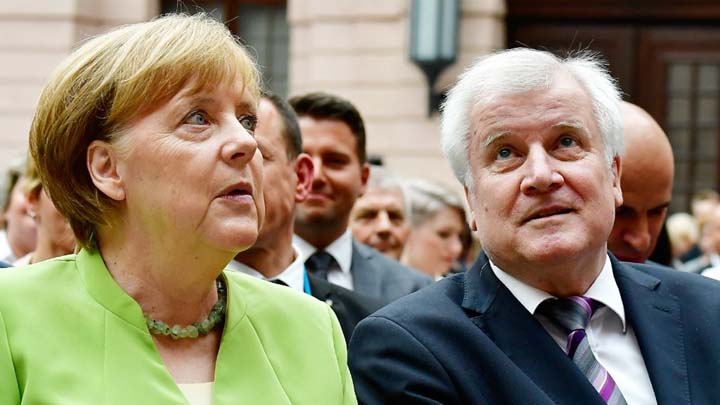
AFP, Germany:
German Chancellor Angela Merkel’s ruling coalition was facing an uncertain future, as her hardline conservative interior minister Sunday offered his resignation after weeks of battling to change her mind on migrant policy.
Horst Seehofer told fellow leaders of the conservative Bavarian CSU party he wants to resign as both party chief and interior minister, saying he had “no support”, sources at their closed-door meeting in Munich told AFP. But CSU parliamentary group chief Alexander Dobrindt “does not want to accept Seehofer’s resignation,” participants in the hours-long huddle said. The lack of clarity from the Bavarian camp raises questions about the future of Merkel’s governing coalition between the CDU-CSU alliance and the centre-left Social Democratic Party (SPD).
If Seehofer does quit, the CSU could offer a replacement interior minister if it aims to remain tied to Merkel’s CDU party.
Alternatively it could break up the two parties’ decades-long partnership, depriving Merkel of her majority in parliament and pitching Germany into uncharted political waters.
To politically survive, Merkel could attempt a minority government, seek a new coalition partner in the ecologist Greens or pro-business Free Democrats, or orchestrate a no-confidence vote in parliament that could trigger new elections.
Meanwhile, the CDU on Sunday offered its sister party no conciliatory gesture in the tug-of-war over whether to seek European solutions to slash migrant numbers or take unilateral national measures.
CDU general secretary Annegret Kramp-Karrenbauer said in Berlin party leaders were “united” behind “effective, humane solutions together with our European partners”.
After the Bavarians’ relentless pressure on Merkel, European leaders on Friday agreed to new measures to reduce immigration to the bloc and so-called “secondary migration” of asylum-seekers between countries.
Merkel, who has been in office since 2005, warned last week the issue of migration could decide the very future of the EU itself.
Leaders said they would consider setting up “disembarkation platforms” outside the EU, most likely in North Africa, in a bid to discourage migrants and refugees boarding EU-bound smuggler boats.
Member countries could also create processing centres to determine whether the new arrivals are returned home as economic migrants or admitted as refugees in willing states.
At the national level, Merkel also proposed that migrants arriving in Germany who first registered in another EU country should be placed in special “admissions centres” under restrictive conditions, according to a document she sent to the CSU and the Socialists.
The document also outlined deals with 16 other countries to return already-registered migrants if they reached Germany.
Sources said Seehofer rejected Merkel’s assessment that the EU-wide measures would “have the same effect” as his demand to turn away at the border asylum-seekers already registered in other EU nations.

